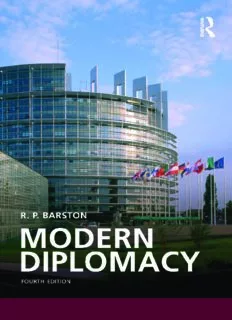
Modern Diplomacy PDF
Preview Modern Diplomacy
Modern Diplomacy This page intentionally left blank Modern Diplomacy Fourth Edition R.P. Barston First published 1998 by Addison Wesley Longman Second edition 1997 Third edition 2006 Fourth edition published 2013 by Pearson Education Published 2014 by Routledge 2 Park Square, Milton Park, Abingdon, Oxon OX14 4RN 711 Third Avenue, New York, NY, 10017, USA Routledge is an imprint of the Taylor & Francis Group, an informa business Copyright © 1988, 2006, 2013 Taylor & Francis The right of R.P. Barston to be identified as author of this work has been asserted by him in accordance with the Copyright, Designs and Patents Act 1988. All rights reserved. No part of this book may be reprinted or reproduced or utilised in any form or by any electronic, mechanical, or other means, now known or hereafter invented, including photocopying and recording, or in any information storage or retrieval system, without permission in writing from the publishers. Notices Knowledge and best practice in this field are constantly changing. As new research and experience broaden our understanding, changes in research methods, professional practices, or medical treatment may become necessary. Practitioners and researchers must always rely on their own experience and knowledge in evaluating and using any information, methods, compounds, or experiments described herein. In using such information or methods they should be mindful of their own safety and the safety of others, including parties for whom they have a professional responsibility. British Library Cataloguing in Publication Data A catalogue record for this book is available from the British Library Library of Congress Cataloging-in-Publication Data Barston, R. P. (Ronald Peter) Modern diplomacy / R.P. Barston. — 4th ed. p. cm. Includes index. ISBN 978-1-4479-2141-7 1. Diplomacy. I. Title. JZ1405.B37 2012 327.2–dc23 2012029872 ISBN: 978-1-4479-2141-7 (pbk) Print edition typeset in 10/12pt New Baskerville by 73 Contents List of figures and tables vii Preface ix Acknowledgments x List of abbreviations xiii 1 The changing nature of diplomacy 1 2 Foreign policy organisation 14 3 Diplomatic methods 32 4 Negotiation 51 5 Developing diplomatic practice 73 6 Groups and networks 96 7 Cyber diplomacy 112 8 International financial relations 124 9 Trade, foreign policy and diplomacy 159 10 Environmental diplomacy 183 11 Environmental diplomacy: case examples 202 12 Disaster and emergency diplomacy 231 vi Contents 13 Diplomacy and security 244 14 Diplomacy and mediation 261 15 The diplomacy of normalisation 274 16 Diplomatic correspondence: case examples 288 17 International treaties 349 18 International agreements: case examples 385 Conclusion 426 Index 428 List of figures 2.1 Finland foreign ministry 19 2.2 UK Foreign and Commonwealth Office 20 2.3 Japanese foreign ministry 21 3.1 Strait of Hormuz 37 6.1 Former states of the Soviet Union 106 9.1 Senkaku Islands 176 11.1 Paris MOU organisational structure 218 11.2 Chad–Cameroon petroleum pipeline 222 12.1 Tsunami warning system in the Pacific 234 12.2 Indian Ocean Tsunami 235 List of tables 1.1 Tasks of diplomacy 2 2.1 Single trade/foreign ministry 22 4.1 Classification of subjects handled in international negotiations 54 8.1 Countries ranked by debt to banks, end December 1982 ($ millions) 138 8.2 List of HIPC countries 150 9.1 Trade and diplomacy 160 9.2 Types of trade diplomacy 160 9.3 Bilateral economic agreements 169 viii List of tables 9.4 Other sources of international trade disputes 173 11.1 Commission strategy: annexation of the Paris MOU 219 12.1 Pacific and other tsunamis 233 13.1 UN peace-keeping operations since 1948 251 13.2 Redefinition strategies 255 15.1 Stages of normalisation 280 Preface The concern of this book is to analyse some of the main elements that make up contemporary diplomacy. Since the completion of the first edition, a number of important changes have occurred within the inter- national system, which have affected players, procedures and the con- tent of diplomacy. The fourth edition has been substantially rewritten to reflect these developments. New chapters have been included on diplo- matic strategy; developing diplomatic practice; communications meth- ods, including media; and emerging networks and groupings. Other important changes covered include issues related to the cyber dimension of diplomacy. In addition, a further feature of this edition has been the opportunity to introduce a number of new or little discussed ideas and concepts including diplomatic space; counter diplomacy; the role of NGOs and other agencies as instruments of the ‘disguised’ state; and the promotion of events and conferences as part of ‘hub’ or niche diplomacy. Modern Diplomacy is organised around six broad areas: the chang- ing nature of diplomacy; developing diplomatic practice; negotiation; emerging groups and networks; use and issues in cyber diplomacy and the operation of diplomacy in specific sectors – international trade, international finance, environment, natural disasters and international conflict (security; mediation; normalisation). The final section of the book reviews and illustrates formal and informal uses in diplomatic practice of diplomatic correspondence and various types of interna- tional agreements. The purpose of this and other sections of the book is to convey something of the varied and complex nature of contempo- rary diplomacy, which the pursuit and study of by the practitioner and analyst, remains central to international relations and the challenge of order. Professor R.P. Barston Sussex
Description: